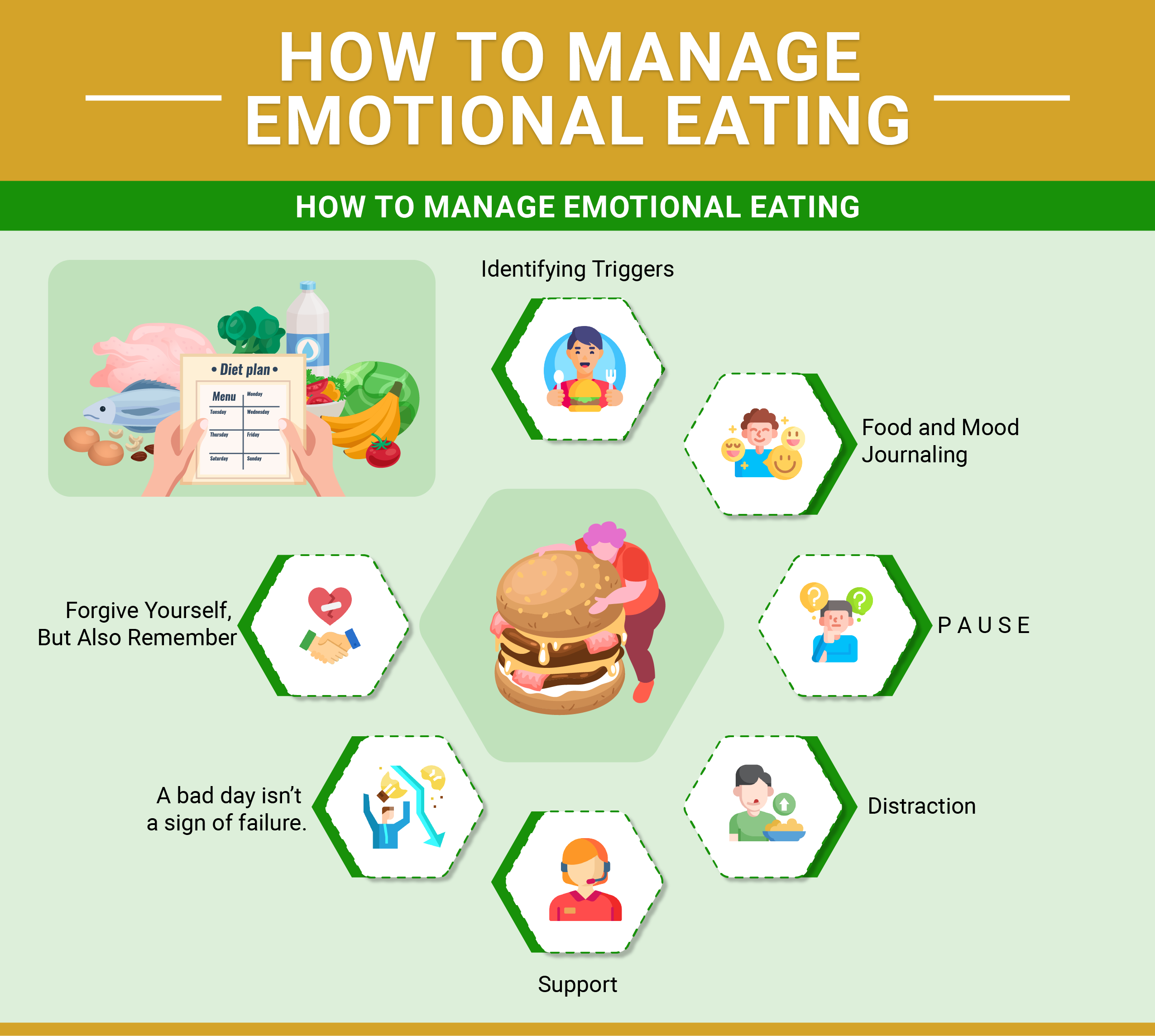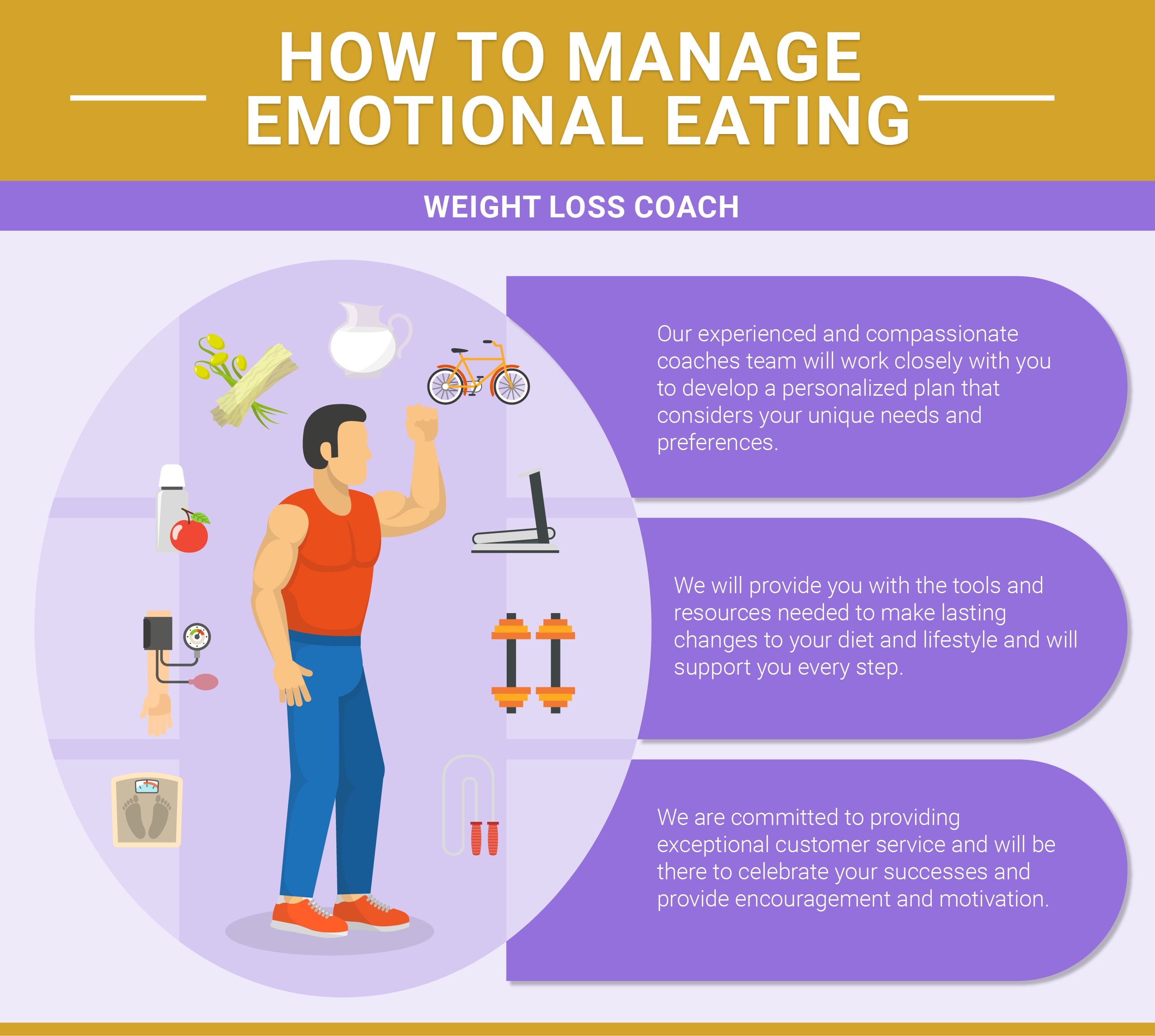Food is consumed for many reasons, and often it is not hunger that motivates us. Despite not experiencing physical hunger, our bodies may experience emotional hunger, such as boredom, stress, anger, happiness, or disappointment.

We've all eaten for various reasons: boredom, stress, anger, or disappointment. We turn to food as a quick fix to avoid dealing with these emotions and their root causes. As a result, emotional eating may consume extra calories throughout the day. To help you achieve your weight and health goals, knowing the difference between emotional and physical hunger cues is helpful.
To manage emotional eating, you must understand the emotions that drive you to food. Why are you eating? What do you feel drives you to eat? An example of a trigger would be a bad day at work or the time of day you feel the need to snack, such as late at night after the kids are in bed.
Unrecognized patterns often cause emotional eating. People often turn to calorie-laden snack foods as a reward after a stressful day at work. While watching their favourite TV show on a weeknight, others crave their favourite ice cream. When we become accustomed to these patterns and behaviours, we don't think twice about them until we pause to ask, “am I hungry? ” “or “am I seeking comfort?”
The use of a food journal can help identify emotional eating. When you keep a journal of what you eat, when, and why you eat, you can identify patterns in your eating habits. Stress-induced deadlines or a bad day may cause late-night snacking. Keeping a journal allows you to reflect on your eating habits, emotions, and when you turned to food for comfort. Taking note of such situations now will help you prepare for them in the future.
Think about whether you are hungry before eating. Is there a reason I am eating? If you're hungry, it may be time for you to eat. The few seconds you have give you a chance to think, and sometimes you can decide whether this snack is what you need (physical hunger) or what you want (emotional hunger). A simple pause can facilitate identifying triggers and patterns and recognizing emotional versus physical hunger cues.
You may find it tempting to grab a snack when you recognize your emotional hunger cues, but you can choose to do something else. If you're stressing out, take a walk; if you're lonely, call a friend, do a house chore you've been avoiding, run an errand, or try something like knitting that makes you use your hands. There are hundreds of things you can do to relieve stress. You just got a moment of victory after taking the time to distract yourself from the craving. This is called riding out cravings!
As a weight loss clinic, we care for our patients at every step. The key to getting through the ups and downs has a support system. There are also online and community support groups for those going through what you are, and we know that support can be immensely helpful. In addition to friends and family, there are also online and community support groups for people going through what you are going through.
All of us are human. There are good days and bad days in our lives. Remember to be present when experiencing a particularly bad day or negative emotion. You can use food journaling to help yourself understand your feelings, why you're feeling them, and what you can do to help yourself. Rather than reaching for your usual comfort food, try letting yourself feel difficult feelings. Imagine how you will feel in the future when you pause. Remember to acknowledge that every day is a new beginning; it's ok to have a bad day now and then.

You ate a cookie. Things like this happen. A key to taking advantage of the cookie guilt-free is to forgive yourself, enjoy the cookie, and move forward. Although it is important to pause and consider what triggered the eating, you should also enjoy your meals. You can learn from it. A sweet treat can be enjoyed because you want it, or it can be enjoyed to soothe an emotion or feel comforted. Take note of where you can make improvements next time, and acknowledge the drivers who need to eat. Your weight and health goals can be achieved by recognizing emotional eating and reducing unnecessary calories from your diet. When you feel yourself reverting to old habits, develop plans to distract yourself when you feel yourself reverting to old habits. Emotions are part of life, and it is important to acknowledge how you feel, regardless of how uncomfortable it may be. You'll be OK. Keep moving forward and practice noticing your emotions. Don't give up. Reach your support system for help, and know you'll be okay.
At Weight Loss Coach, we are dedicated to helping you achieve your weight loss goals. Our experienced and compassionate coaches team will work closely with you to develop a personalized plan that considers your unique needs and preferences. We will provide you with the tools and resources needed to make lasting changes to your diet and lifestyle and will support you every step. With our help, you can overcome obstacles and stay on track, even when the going gets tough. We are committed to providing exceptional customer service and will be there to celebrate your successes and provide encouragement and motivation. When you choose us for your weight loss journey, you can be confident that you will have the support and guidance you need to succeed.

Comments